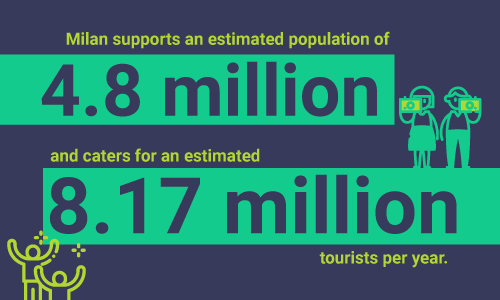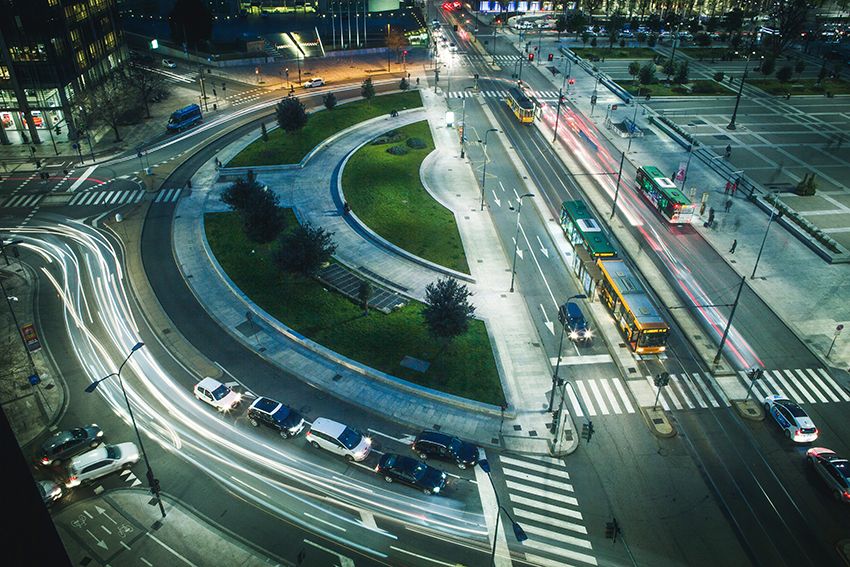Milan

Often associated with high fashion, the arts, and leisure, city officials now hope the area will become a leader in intelligent urban solutions in Europe.
Milan was rated as Italy’s smartest city for the fifth year in a row in 2018, according to ICity Rate. The report bases its choices on indicators including inclusivity, schemes to improve resident wellbeing, and the use of intelligent solutions for city service improvements.

The Municipality of Milan says that the quest to become smart is not just relevant to keeping wealth generation at high levels, but also should be used to “exploit innovation with a view to developing new methods of tackling socially relevant problems,” including inequality, economic imbalance, unrest, and issues surrounding social care.
The journey began with the introduction of an initiative called “Towards Milan as a Smart City” in 2014. Over the past five years, city officials have experimented with a number of intelligent solutions, social innovations, and community-driven initiatives designed to improve the lives of residents.
Milan is a pilot area included in the Sharing Cities 2016 - 2020 EU initiative. Alongside Lisbon and London, Milan is a “lighthouse” city which is able to access an investment pot of €24 million to create a common approach as well as commercial and financially viable solutions for smart city development
Milan set out a number of smart city goals; to make the area a living European innovations lab; to launch sustainable urban mobility solutions, to create intelligent environmental and energy policies, the promotion of social inclusion and diversity, and to encourage a thriving startup scene.
80%
A 5G trial has also been launched and Milan now has 80 percent coverage in preparation for the arrival of the next-generation mobile network. Vodafone says that all of Milan will be covered by the end of 2019.
Vodafone, Huawei, and Milan’s Politecnico University have also launched “Action for 5G,” an initiative which is supporting startups over the next four years involved in 5G mobility and apps, Industry 4.0 technologies, augmented and virtual reality (AR/VR), and smart city projects.
The platform allows anyone to access information online relating to the community, such as environmental information, economic reports, healthcare data, and more.
This emerging connectivity has given rise to a partnership with Microsens to install emergency call pillars in city parks and over 800 surveillance cameras in “critical” areas which required additional security, according to officials.
Transport has not been ignored in Milan’s plans to become a smart city. The Electric City Mover project, launched in partnership with Telecom Italia, involved the creation of a “digital island” system in which locals and tourists alike can rent electric vehicles as well as access transport information from mobility “totems” established in city hotspots.
Congestion is an area in which city officials have focused their energies on. The implementation of a ban on older, polluting vehicles has been followed by a smart ticketing and payment system.
The funds are being invested in clean fuel infrastructure and technologies, including the purchase and installation of 60 electric vehicle charging points, 125 smart parking bays, 150 e-bikes, and 14 sharing stations.
60%
Milan has also retrofitted a number of public and private buildings to improve energy efficiency with the hope of reducing energy consumption by up to 60%. The retrofits have included the installation of energy management systems which give residents access to data concerning their usage, improved insulation, and solar panels.
In a place known as “Area C,” city officials implemented parking charges which could be paid via text, the web, and mobile applications. The scheme generated €20.3 million in 2012 upon launch. By 2017, Milan had generated €28 million
To expand energy efficiency systems, Milan has also integrated and installed over 300 smart, Wi-Fi and sensor-enabled street lights in public areas.

The city’s Open Care initiative is also of note. This smart city project focuses on the design of new tools and technologies to promote individual care through digital services which will assist in areas including nursing and community care.

Projects including the design and development of technological means to unobtrusively assist elderly citizens living on their own have been funded through the program. In total, roughly €330,000 has been raised through the platform.
However, Milan found that purchasing a platform to continue on the service was not cost-effective, and in order to save public resources, transferred Civic to Anteprima after the trial’s closure.
The original online platform was in operation for 18 months with a €30,000 investment from the city. Startups were able to pitch their ideas for community-driven projects and request funding.
Milan has also attempted to secure resident opinions on the issues that most need attending to through the launch of the Civic crowdfunding platform.
50%
If members of the community decided a proposal was of value, they could contribute to its funding. If a project reached 50% of its funding target, Milan contributed the remainder.
Looking ahead, Milan continues to work on smart projects to reduce waste, reduce the environmental impact of city living, and continue to improve the lives of residents. The city was recently made a finalist of the Wellbeing Award from the NewCities Foundation, and as a key European hotspot for both tourists and Italian nationals, it is likely that Milan will continue in its drive to become a blueprint for a modern, smart city.
















